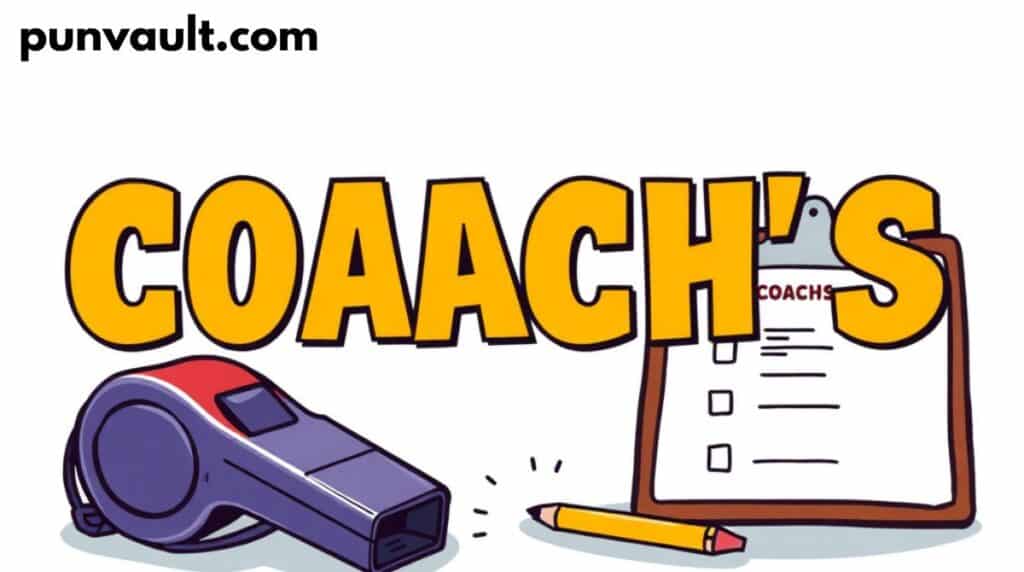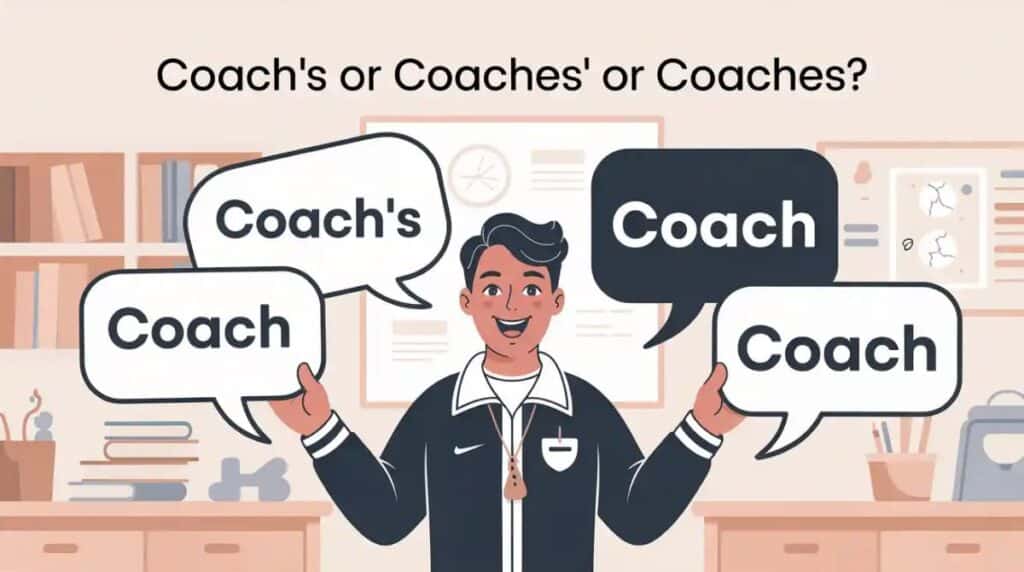The phrase “Coach’s or Coaches’ or Coaches? Understanding the Differences” refers to the distinction between three commonly confused forms of the word “coach.” “Coach’s” is the singular possessive form, indicating something that belongs to one coach. “Coaches’” is the plural possessive form, used when something belongs to multiple coaches. Lastly, “coaches” is the simple plural form of “coach,” referring to more than one coach without showing possession. Mastering these variations is essential for writing with precision and clarity.
In today’s fast-paced world of digital communication, a single punctuation mark can change the entire meaning of a sentence. Whether you’re a student, professional, or writer, misusing these forms can affect your message and credibility. Knowing how to use them correctly is not just about grammar—it’s about confidence in communication.
This guide will walk you through the subtle yet powerful differences between “coaches,” “coaches’,” and “coaches.” With real-life examples and simple explanations, you’ll gain the clarity needed to use each form accurately and effectively.
Why This Grammar Mistake Costs You Credibility
Picture this: You’re sending an important email to your company’s athletic director about the quarterly budget. You write, “The coach needs new equipment for next season.” Hit send. Done.
Except you just made a grammar mistake that screams “amateur” to anyone who notices. That misplaced apostrophe doesn’t just look wrong—it changes your entire message’s meaning.
Research from Grammarly shows that professional communication suffers dramatically when grammatical errors creep in. In fact, 59% of hiring managers would reject a candidate based on poor grammar alone. Your writing credibility hangs on these tiny details.
The good news? You can master coach’s, coaches, and coaches’ in the next few minutes. No more second-guessing yourself. No more looking unprofessional. Just clear, confident communication that gets results.
The Foundation: What Each Form Actually Means
Coach’s (Singular Possessive)

When you see coaches, you’re looking at one coach who owns something. The singular possessive form tells us exactly what belongs to that single person.
The formation rule is simple: coach + ‘s. Think of it as “coach is” or “coach has” compressed into one word.
Memory trick: “One coach’s whistle” – you can hear that single whistle in your mind.
Common contexts where you’ll use this form:
- Performance reviews: “The coach’s leadership style improved team morale.”
- Equipment requests: “Please approve the coach’s budget for new gear.”
- Meeting notes: “The coach’s presentation covered three key points.”
Coaches (Simple Plural)
The plural form coaches simply means more than one coach. No ownership involved. You’re just counting people.
Formation rule: coach + es. Standard English pluralization.
Memory trick: “Counting coaches” – like counting sheep, but more athletic.
You’ll use this when:
- Describing staff: “We hired three new coaches this season.”
- Making announcements: “All coaches must attend tomorrow’s meeting.”
- Writing reports: “The coaches completed their certifications.”
READ MORE:15 Effective Ways to Turn a Girl On: How to Make a Girl Horny with Confidence and Respect
Coaches’ (Plural Possessive)
Here’s where things get tricky. Coaches’ means multiple coaches collectively own something. The plural possessive form shows group ownership.
Formation rule: coaches + ‘ (apostrophe after the s). This is the form that trips up most people.
Memory trick: “All coaches’ equipment” – imagine a shared storage room.
Real-life grammar examples include:
- Team communications: “The coaches’ meeting room is being renovated.”
- Budget documents: “The coaches’ salary increases take effect immediately.”
- Policy updates: “The coaches’ responsibilities have expanded.”
Side-by-Side Comparison: See the Differences Instantly
| Form | Meaning | Example | When to Use |
|---|---|---|---|
| Coach’s | One coach owns something | “Five coaches attended.” | Singular possessive |
| Coaches | Multiple coaches, no ownership | “Five coaches attended” | Plural form |
| Coaches’ | Multiple coaches own something | “The coaches’ lounge” | Plural possessive |
Let’s see how the same sentence changes meaning:
- “The coach’s equipment needs replacing” (one person’s gear)
- “The coach’s equipment needs replacing” (grammatically wrong)
- “The coaches’ equipment needs replacing” (shared gear for multiple people)
Quick Identification Flowchart
- Count the coaches: One or many?
- Check for ownership: Do they possess something?
- Apply the rule: One owner = ‘s, Many owners = s’
Real-World Application: Where You’ll Use Each Form
Educational Settings
Student-teacher communications demand precision. When you’re writing to parents about their child’s progress, grammar rules matter immensely.
Email grammar examples:
- “Your son’s coach’s feedback was overwhelmingly positive” (one coach)
- “The coaches will evaluate all players next week” (multiple coaches)
- “The coaches’ consensus is that practice should start earlier” (group decision)
School newsletters require writing clarity. Parents notice when you mess up apostrophe usage. They question your attention to detail across all areas.
Academic reports showcase your writing professionalism. When you write “The coaches’ assessment indicates improvement,” you’re demonstrating mastery over grammatical nuances.
Professional Sports Context

Team communication in professional sports moves fast. Mistakes in possessive nouns can create confusion during critical moments.
Media interviews demand flawless sentence structure. Sports reporters will quote you exactly. Get the grammar wrong, and thousands of fans see your mistake.
Contract negotiations involve report writing where every word matters. “The coach’s bonus structure” versus “The coaches’ bonus structure” represents entirely different financial commitments.
Business and Corporate Training
Executive coaching scenarios require effective communication. When you’re documenting a CEO’s progress, miscommunication risks are high.
Training program documentation needs report clarity. HR departments scrutinize every detail. Common grammar mistakes reflect poorly on the entire program.
Performance reviews showcase your proofreading strategies. Managers notice when you write “The coach’s recommendations” versus “The coaches’ recommendations” correctly.
The Costly Mistakes: What Goes Wrong Most Often
The “Greengrocer’s Apostrophe” Problem
This infamous error involves using apostrophes for simple plurals. You see it everywhere: “Apples for sale” or “Coaches wanted.”
Writing tips to avoid this:
- If you’re just counting, no apostrophe needed
- “We need more coaches” (counting people)
- “The coaches arrived early” (describing actions)
Mixing Up Plural Possessive
The coaches’ versus coach’s confusion stumps even experienced writers. Here’s why it happens:
Grammatical errors occur when people:
- Forget to count first (one or many?)
- Place the apostrophe randomly
- Don’t consider ownership vs plurality
Grammar mistakes compound when you’re writing quickly. Take that extra second to think through the logic.
Professional Consequences

Real examples from business communications show the impact:
Case Study 1: A sports marketing firm lost a $50,000 contract because their proposal contained multiple apostrophe usage errors. The client questioned their attention to detail across all services.
Case Study 2: A university athletics department received complaints from parents about newsletter grammar. They cited “unprofessional team communication” as a concern about program quality.
Case Study 3: A corporate training company’s email grammar mistakes led to a 30% increase in client revision requests. Their writing credibility suffered industry-wide.
The Foolproof Method: Never Make These Mistakes Again
The Three-Step Test
Step 1: Count the coaches (one or many?)
- One coach = potential for coaches
- Multiple coaches = potential for coaches or coaches’
Step 2: Check for ownership (do they possess something?)
- No ownership = coaches (plural)
- With ownership = coach’s or coaches’
3: Apply the correct rule
- One owner = coach’s
- Multiple owners = coaches’
Quick Mental Shortcuts
“One coach, many coaches, many coaches” – repeat this mantra until it becomes automatic.
Substitution technique: Replace “coach” with “teacher” or “player” to check your logic:
- “The teacher’s lesson plan” = “The coach’s game plan”
- “The teachers’ lounge” = “The coaches’ lounge”
Common Sentence Patterns
Email templates that work:
Professional greeting: “I’m writing to discuss the coach’s performance review scheduled for next week.”
Team updates: “The coaches have completed their summer training requirements.”
Resource requests: “The coaches’ equipment budget needs approval before the season starts.”
Advanced Scenarios: Tricky Situations Solved
Joint Ownership vs. Individual Ownership
When multiple coaches own things together, use the coaches’:
- “The coaches’ shared office space”
- “The coaches’ collective bargaining agreement”
When each coach owns something separately, get specific:
- “Each coach’s individual performance metrics”
- “Every coach’s personal training philosophy”
Names Ending in ‘s’
Coach Williams creates a special case. Style guides differ, but business writing typically uses:
- Coach Williams’s team (adds)
- Coach Williams’ team (add apostrophe only)
Both are acceptable. Pick one style and stay consistent throughout your document.
Compound Possessives

Complex organizational structures require careful sentence structure:
- “The head coach’s and assistant coaches’ responsibilities”
- “The coach’s and players’ shared commitment”
Usage tips: When mixing singular possessive and plural possessive, each noun gets its own apostrophe treatment.
Practice Makes Perfect: Interactive Examples
Email Scenarios
Before: “The coaches are meeting at 3 PM to discuss the coaches’ equipment needs.”
After: “The coaches are meeting at 3 PM to discuss the coaches’ equipment needs.”
Context clues that help you choose:
- “are meeting” indicates multiple people (coaches)
- “equipment needs” shows ownership (coaches’)
Document Examples
Meeting minutes: “The coaches’ unanimous decision was to extend practice by 30 minutes.”
Training manuals: “Each coach’s certification must be renewed annually.”
Performance evaluations: “The coaches exceeded all performance benchmarks this quarter.”
Self-Check Quiz
- “The _____ locker room needs cleaning.” (Multiple coaches share it)
- “I spoke with the _____ about the new policy.” (One coach)
- “The _____ attended the conference.” (Multiple coaches)
- “The _____ feedback was constructive.” (One coach)
- “The _____ meeting ran late.” (Multiple coaches’ meeting)
Answers: 1. coaches’ 2. coach’s 3. coaches 4. coach’s 5. coaches’
Beyond Grammar: Why Precision Matters
Professional Credibility
First impressions in written communication happen instantly. Your audience’s understanding depends on writing clarity from the very first sentence.
Authority comes from attention to detail. When you nail the possessive form consistently, readers trust your expertise across all areas.
Clear Communication
Avoiding misunderstandings starts with proper grammar. When you write “The coach’s decision,” everyone knows exactly one person made that choice.
Ensuring your message hits home requires effective communication. Mixed-up apostrophe usage creates confusion that derails your entire point.
Career Impact
Proofreading strategies that include grammar checks can accelerate promotions. Managers notice employees who communicate clearly.
Standing out in competitive fields often comes down to writing professionalism. When everyone else makes common grammar mistakes, your precision becomes your advantage.
Action Steps: Implement What You’ve Learned
Immediate Actions
Review your last five emails. Count how many times you used coach’s, coaches, or coaches’. Were they correct?
Update your go-to templates. Create email grammar templates with correct apostrophe usage built in.
Practice with real scenarios. Take actual documents from your workplace and check every instance of possessive nouns.
Long-term Habits
Proofreading checklist:
- Count subjects (one or many?)
- Check for ownership
- Apply apostrophe rules
- Read sentences aloud
Grammar resources to bookmark:
- Grammarly for real-time checking
- Purdue OWL for comprehensive rules
- Your company’s style guide
Apps and tools that help:
- Hemingway Editor for sentence structure
- ProWritingAid for grammatical errors
- Grammarly for apostrophe usage
Sharing Knowledge
Teaching others reinforces your own learning. Share these writing tips with colleagues who struggle with grammar rules.
Creating team standards ensures everyone uses coaches, coaches, and coaches’ correctly. Team communication improves when everyone follows the same rules.
Building a better communication culture starts with individuals who care about writing clarity. Your example encourages others to improve their grammar.
Quick Reference: Your Grammar Cheat Sheet
Emergency Decision Tree

Question 1: How many coaches?
- One → Continue to Question 2
- Many → Continue to Question 3
Question 2: Does the one coach own something?
- Yes → Use the coach’s
- No → Use coach (singular)
3: Do the multiple coaches own something?
- Yes → Use coaches’
- No → Use coaches
Common Phrases You Can Copy
Meeting contexts:
- “The coach’s presentation will begin at 2 PM.”
- “All coaches must attend the workshop.”
- “The coaches’ feedback session is scheduled for Friday.”
Email openers:
- “I’m writing to discuss the coach’s performance.”
- “The coaches have submitted their reports.”
- “The coaches’ recommendations are attached.”
Report language:
- “The coach’s leadership style has evolved.”
- “The coaches completed their training.”
- “The coaches’ collective input shaped this policy.”
Master these three forms, and you’ll never again hesitate before hitting send on that important email. Your professional communication will reflect the competence and attention to detail that advance careers and build trust.
Remember: grammar isn’t about perfection—it’s about clarity. When you use coaches, coaches, and coaches correctly, you eliminate confusion and demonstrate professionalism. That’s the difference between good communication and great communication.
Conclusion
In conclusion, Coach’s or Coaches’ or Coaches? Understanding the Differences helps you write more clearly and correctly. Each form has its own use: “coach’s” shows something belongs to one coach, “coaches’” shows it belongs to many coaches, and “coaches” just means more than one coach. Knowing when and how to use them makes your writing stronger and more professional.
Whether you’re writing an email, a report, or a school paper, Coach’s or Coaches’ or Coaches? Understanding the Differences is a skill worth learning. It may seem small, but using the right word form can make a big difference. Keep practicing, and soon it will become easy and natural in your writing.
FAQs
1. What’s the difference between “coach’s,” “coaches’,” and “coaches”?
“Coach’s” is singular possessive (belonging to one coach), “coaches’” is plural possessive (belonging to multiple coaches), and “coaches” is just plural (more than one coach).
2. When should I use “coach’s”?
Use “coach’s” when showing something belongs to one coach, like “the coach’s whistle.”
3. When is “coaches’” correct?
Use “coaches’” to show possession belonging to several coaches, for example, “the coaches’ meeting.”
4. Is “coaches” ever possessive?
No. “Coaches” is solely the plural of coach, as in “The coaches arrived early.”
5. Why does this matter?
Using these forms correctly makes your writing clearer and more professional.

Carlos Wise is the undisputed king of comebacks and the master of roast-worthy wit. With a sharp tongue and a sharper sense of humor, he crafts savage one-liners and hilarious insults that leave no mic un-dropped. When he’s not penning legendary burns, Carlos is busy decoding the art of sarcasm and turning everyday moments into comedy gold. If you’re looking for a laugh with bite, Carlos delivers every time.







